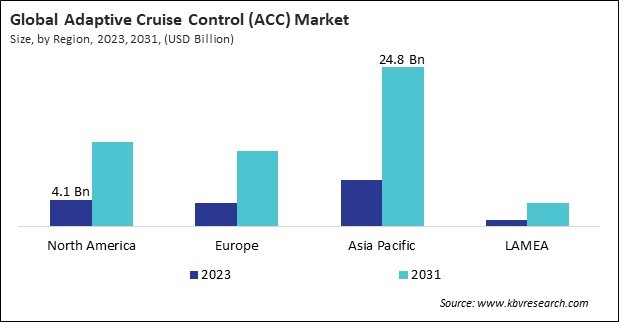According to a new report, published by KBV research, The Global Adaptive Cruise Control (ACC) Market size is expected to reach $53.3 billion by 2031, rising at a market growth of 17.0% CAGR during the forecast period.
The primary function of ACC is to increase vehicle safety. It helps prevent accidents, particularly rear-end collisions, by ensuring the vehicle maintains an appropriate distance from the vehicle ahead. When the system detects that the vehicle is getting too close to the one in front, it will automatically reduce the speed to maintain a safe following distance. This feature helps to mitigate the risk of human error, which is often a contributing factor in accidents.

The OEMs (Original Equipment Manufacturers) segment captured the maximum revenue in the Global Adaptive Cruise Control (ACC) Market by Product Sales in 2023, thereby, achieving a market value of $37.6 billion by 2031. This dominance is largely due to the integration of ACC systems as a standard or optional feature in new vehicles produced by leading automotive manufacturers. OEMs are pivotal in incorporating ACC technology during vehicle manufacturing, ensuring high compatibility and seamless operation.
The Standalone ACC segment is a CAGR of 16.7 % during the forecast period. Standalone ACC systems are designed to manage vehicle speed and maintain safe following distances without integrating with other advanced driver assistance systems (ADAS). The high revenue share of this segment is driven by the widespread adoption of ACC as a key feature in modern vehicles, providing enhanced safety and driving comfort.
The Radar Sensors segment led the maximum revenue in the Global Adaptive Cruise Control (ACC) Market by Component in 2023, thereby, achieving a market value of $24.3 billion by 2031. Radar sensors are widely used in ACC systems due to their reliability in various weather conditions and their ability to detect objects at long ranges accurately. Their cost-effectiveness and capability drive the high adoption rate of radar sensors in ACC systems to provide real-time data for maintaining safe distances between vehicles, enhancing overall road safety.
The Passenger Car segment is growing at a CAGR of 16.6 % during the forecast period. This substantial share can be attributed to the increasing consumer demand for enhanced safety and comfort features in personal vehicles. The widespread adoption of ACC systems in passenger cars is driven by the growing emphasis on advanced driver assistance systems (ADAS) that enhance driving convenience and reduce the risk of accidents.
Full Report: https://www.kbvresearch.com/adaptive-cruise-control-market/
The Asia Pacific region dominated the Global Adaptive Cruise Control (ACC) Market by Region in 2023, and would continue to be a dominant market till 2031; thereby, achieving a market value of $24.8 billion by 2031. The North America region is anticipated to grow at a CAGR of 16.2% during (2024 - 2031). Additionally, The Europe region would witness a CAGR of 16.5% during (2024 - 2031).
By Product Sales
By Type
By Component
By Vehicle Type
By Geography
 Unique Offerings
Unique Offerings